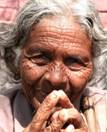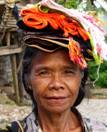|

|
|
ECLAC Activities toward a
UN Convention for Older Persons
Brasilia Declaration | First Follow-Up Meeting of the Brasilia Declaration | Second Follow-Up Meeting of the Brasilia Declaration |
Third Follow-Up Meeting of the Brasilia Declaration
Brasilia Declaration
Brasilia Declaration: Outcome of the Second Regional Intergovernmental Conference on Ageing in Latin America and the Caribbean (December 2007)
Between December 4 and 6, 2007, Latin America and Caribbean representatives gathered in Brasilia to identify the future priorities for implementing MIPAA in the region. Representatives adopted the Brasilia Declaration as a strong outcome of this Conference. Indeed, in points 25 and 26, the representatives pledge Governments to “promote the drafting of a convention on the rights of older persons within the framework of the United Nations.”
The Brasilia Declaration represents a first step towards a Human Rights Convention on Ageing!
First Follow-Up Meeting of the Brasilia Declaration
ECLAC Follow up Meeting on the December 2007 Brasilia Declaration (September 16-17, 2008)
Global Action on Aging had the privilege to be invited to the ECLAC Follow up Meeting on the December 2007 Brasilia Declaration, in September 2008. The Government of Brazil’s Aging Human Rights Office organized and hosted the session in Rio de Janeiro. Its purpose was clear: to draw up principles that would lead to the creation of a Special Rapporteur who would (1) document the situation of older persons’ rights worldwide and (2) develop evidence to advance consideration of a Human Rights Convention at the United Nations. Susanne Paul, GAA President spoke during the sessions about ongoing efforts to ensure the human rights of older persons, including the need for a Convention. You can read the full speech in
English or in
Spanish. A full report of the Rio meeting is also available in
English or
Spanish. Finally, the picture gallery is available
here.
Second Follow-Up Meeting of the Brasilia Declaration
Argentina: To Attain the Full Exercise of the Rights of Older Persons (May 28, 2009)
(Article in Spanish)
Argentina hosted the “Second Meeting on the Follow-up of the Brasilia Declaration” on May 21st and 22nd.
Responding to the invitation of the Argentine Ministry of Social Development, representatives from 22 countries in Latin America and the Caribbean convened for this important meeting. They discussed important goals for any aging rights document, including full and effective participation and inclusion of older persons in society, equality of opportunities, the recognition of the links and commonalities among people that draw them together as members of a shared community. Interestingly, Argentina raised the issue of older persons in an international setting for the first time in 1948 as an initiative of Eva Duarte de Perón, when she addressed the General Assembly Meeting of the United Nations.
Argentina: 2nd Meeting of the Brasilia Declaration: Towards a Convention on the Rights of Older Persons (May 21 and 22, 2009)
(Report in Spanish)
Buenos Aires was the seat of the 2nd Meeting of the Brasilia Declaration towards a Convention on the Rights of Older Persons held on May
21-22, 2009. Representatives of governments, organizations focused on older persons, civil society, and international agencies of various countries attended the meeting to discuss developments and challenges in the aging field. The meeting was divided into panels in which all participants underscored the need to establish a strategic and binding framework that will guide policies towards older persons while respecting individual cultures. They also stressed that the participation of civil society, including that of older persons, is essential in the creation of a Convention,
echoing the conviction that human rights always need to be made from the grassroots up.
Second Follow-Up Meeting of the Brasilia Declaration Towards a Convention on the Rights of Older Persons (May 21-22, 2009)
(Also available in Spanish)
Thanks to the Argentine government’s efforts towards a Convention for the promotion and
defense of the rights of older persons, representatives from 22 countries from within and without the region met in May. This report highlights demographic ageing and shows how every country in the world has experienced changes in the distribution of its population by age, even in the midst of regional differences. During the meeting, the group agreed on fundamental principles and some minimum items that must guide a future Convention.
Argentina: Government Participation in Buenos Aires Meeting (May 20-21, 2009)
On May 20-21, 2009, experts met in Buenos Aires, Argentina, to discuss a potential Regional Human Rights Convention on Ageing. The International Relations Minister from the Argentine Republic
attended, along with peers from other Latin and Caribbean nations. The experts shared ideas about important features of a Human Rights Convention. The Argentine government provided a document for participants to discuss. At the meeting’s conclusion, governments agreed to meet again in November 2009. GAA’s reporter, Beth Hernandes, concluded that the participants, both government and NGOs, increasingly favor a Regional Human Rights Convention.
Third Follow-Up Meeting of the Brasilia Declaration
Latin America: Moving Towards a Convention for the Rights of Older Persons (October 12, 2009)
(Article in Spanish)
On October 5-6, more than 240 representatives of nine countries from Latin America and the Caribbean met in ECLAC headquarters in Santiago, Chile, to discuss the challenges and strategies for achieving an International Convention to Promote the Human Rights of Older Persons. The participants analyzed the situation facing older persons in the Latin American and Caribbean region. One of their many conclusions included the likelihood that increases in longevity of older persons in poverty situations will lead to increased economic, social, political and cultural problems.
Report on Third Follow Up to the Brasilia Declaration of 2007 Calling for a UN Convention or a Special Rapporteur on the Rights of Older Person (October 6, 2009)
Susanne Paul, GAA President, was invited to join government experts and NGOs from Latin America to discuss the possibility of a regional convention for older persons. Susanne Paul described to the participants the world-wide NGO aging movement and gave special attention to the NY NGO Committee in Ageing’s Subcommittee to Promote a Human Rights Convention. She described the intent of the Subcommittee to educate its constituencies about the history of human rights activism as well as offer basic education around what a convention can accomplish, to describe the processes leading to adoption and to involve world citizens in the debate.
Chile: Conclusions of the Third Anniversary Meeting on the Brasilia Declaration (October 5-6, 2009)
(Article also available in Spanish)
Representatives of countries participating in the Third Anniversary meeting following the adoption of the Brasilia Declaration for the Rights of Older Persons that was held in Santiago, Chile, October 5-6, confirmed the need to establish a strategy based upon participation and consensus. Also, the participating governments were urged to ask their Missions in Washington, DC, to call for a special session of experts and representatives of governments to discuss the feasibility of an Inter-American Convention on the “Rights of Older Persons.”
Chile: Reasons for the III Follow up Meeting of the Brasilia Declaration for the Rights of Older Persons- Presentation of Paula Forttes
Valdivia, Director of the National Service for Older Persons (October 5 and 6, 2009)
(Report also available in Spanish)
Paula Forttes Valdivia, Director of the National Service for Older Persons (SENAMA) and primary organizer of the III Follow up Meeting held in Chile, described the reality of older people who now have become a priority group for Social Protection Policies. She also listed the reasons to advance a Convention for the Rights of Older Persons, saying that governments must put aging issues into their public policies. They must respond to the vulnerability of older persons. They need to create legal mechanisms to promote and protect the human rights of older persons, Forttes Valdivia emphasized.
Chile: Economic, Social and Cultural Rights: Instruments and Obligations of the Countries in Relation to Older Persons- (October 5 and 6, 2009)
(Report also available in Spanish)
Read this presentation of Dirk Jaspers-Faijer, director of the Demographic Center for Latin America and the Caribbean, Population Division of CEPAL, at the III Follow up meeting of the Brasilia Declaration for the Rights of Older Persons. He outlined the main themes to be taken up at the Chilean event. The Director began with the definition of economic, cultural and social rights of all people and the obligation of all countries to protect these rights. Jaspers-Faijer focused on the central theme: to recognize older persons as a group with special interests that require the adoption of an International Convention for the Rights of Older Persons.
Chile: Presentation of Mónica Roqué, Director of the National Policy of Older Persons at the Ministry of Social Development, Argentina, at III Follow up Meeting of the Brasilia Declaration for the Rights of Older Persons (October 5 and 6, 2009)
(Report also available in Spanish)
Mónica Roqué began her presentation with statistics describing the process of population aging today and in the future. In 2007, 10.7 per cent of the world population was 60 years or older, while it is estimated that in 2050 the per cent will increase up to 21.7. Also, it is estimated that that the pace of increase among the older population will be faster in Latin America and the Caribbean than any other region. The report reveals the risks associated with an aging population and the need to work on a UN Convention to guarantee the rights of older persons and in particular, their economic security, social and political protection and healthcare.
Chile: Towards a Universal/Regional Convention for the Human Rights and Fundamental Liberties of Older Persons (October 5 and 6, 2009)
(Report also available in Spanish)
This Presentation of the Pan American Health Organization at the III Follow up meeting of the Brasilia Declaration for the Rights of Older Persons focused on human rights. PAHO lawyer Javier Vasquez pointed out the existing international instruments and mandates for protection of older persons. He demonstrated that all existing regional and international instruments can contribute to the adoption of an International Convention or a Special Rapporteur to protect the human rights of older persons.
Latin
America and Caribbean: Interview with Dirk Jaspers-Faijer (October 2009)
(Article in Spanish)
Dirk Jaspers-Faijer, director of Economic Commission for Latin America
and the Caribbean, affirmed the growing awareness of aging as an important
issue for society and its development. He highlighted the notable advances
that the governments and people have put into action throughout Latin
American and the Caribbean that benefit older persons. Although there are
still enormous challenges ahead, he said that older persons and the
organizations that represent them are gaining more and more prominence
locally and on the national scene.
Argentina: Interview with Mónica Roqué (October 2009)
(Article in Spanish)
Mónica Roqué, national director of Politics for Older Adults of the
Department of Social Development of Argentina, reported that in Argentina
the paradigm of the rights of older persons has been installed vigorously.
Older people are taking part in many organizations dedicated to their
interests. Roqué shared that Argentina has drawn on international law to
demonstrate that Latin America and the Caribbean needs a binding legal
instrument that protects older persons.
Chile: Interview with Paula Forttes Valdivia (October 2009)
(Article in Spanish)
Paula Forttes Valdivia, director of Senama, a large Chile-based advocacy
group promoting the rights of older persons, emphatically stated that the
aging population constitutes a reality that cannot be ignored. Furthermore,
the demographic data and the requirements unique to older people dictate
that their rights and needs be recognized.




|



